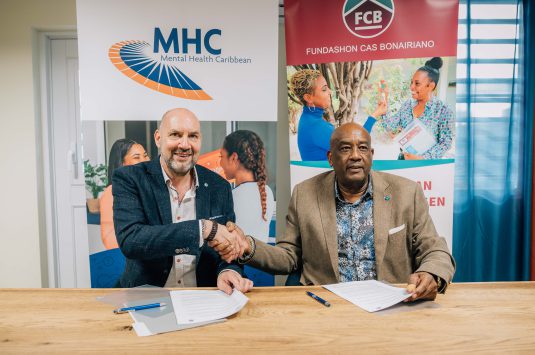
World Mental Health Day 2022
09 October 2022
CARIBBEAN NETHERLANDS – On October 10th World Mental Health Day is observed worldwide. This year’s theme is ‘Make mental health & well-being for all a global priority’. Today it is also 12 years ago that Bonaire, Saba and St. Eustatius became special municipalities of the Netherlands. To be able to make everyone’s mental health a priority, we also need to look at the socio-economic situation of the islands.
But first, what exactly is mental health and well-being? The World Health Organization (WHO) defines it as follows: “Mental health and well-being is a state of well-being in which the individual realizes his or her own abilities, can cope with the normal stresses of life, can work productively and fruitfully, and is able to contribute to deliver to his or her community’. The circumstances in which a person lives are often linked to the financial situation. For example, someone who lives in poverty will generally live in less favorable conditions and this affects his physical and mental health.
When merging with the Netherlands, it was expected that the socio-economic conditions on the islands would improve, but unfortunately there is still a lot of poverty. As various studies have shown, 40% of the population lives below the poverty line. Scientific research has repeatedly shown that poverty and mental health problems influence each other. The daily stresses of getting by or meeting basic needs and the problems sleeping as a result of it, put people living in poverty at a greater risk of developing mental illnesses, such as depression, anxiety disorders and addiction. In addition, people living in poverty are less able to make long-term decisions due to chronic stress. Often an unhealthy lifestyle, such as smoking, unhealthy diet and little exercise can develop. This in turn leads to physical problems, such as diabetes.
Poverty has an effect on how we feel, think and act. These effects are not only negative in themselves (for example, that people living in poverty are less happy), but can also perpetuate poverty. People with a chronic illness (both mental and physical) are more likely to experience financial problems due to incapacity for work and loss of work. Poverty also increases the risk of parenting problems or failure at school. All of these factors also affect the development of children in poor families, and make it likely that the problems will be passed on to the next generation. Stigma and shame surrounding poverty can cause social support from family or friends to fall away and adequate help for (financial) problems is then not sought.
Lately, more initiatives are being taken to combat poverty and thus improve the well-being of society. This development is also to be welcomed in the context of World Mental Health Day, but there is still a long way to go. A logical way to tackle poverty is to ensure that people have more money, for example through better social facilities. In addition, we as MHC have a role in strengthening the psychological resilience of society. MHC will continue to work with stakeholders to break this vicious cycle and further improve the quality of life of the inhabitants of the Caribbean Netherlands.


